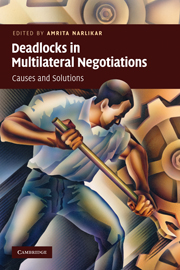Introduction
Published online by Cambridge University Press: 05 June 2012
Summary
At the still point of the turning world. Neither flesh nor fleshless;
Neither from nor towards; at the still point, there the dance is,
But neither arrest nor movement. And do not call it fixity,
Where past and future are gathered. Neither movement from nor towards,
Neither ascent nor decline. Except for the point, the still point,
There would be no dance, and there is only the dance.
T. S. Eliot, Burnt Norton, Four QuartetsDeadlocks are the still points of all negotiation. In their stillness lies much promise but also the potential to inflict much damage. They are a familiar feature of most negotiations, ranging from the realm of the everyday to that of high politics. While there exists a rich body of literature on how to negotiate wisely and effectively, very few works have focused specifically on the problem of deadlocks. Deadlocks in Multilateral Negotiations: Causes and Solutions addresses this gap, and is designed to facilitate interdisciplinary exchange on the subject of deadlocks. Together, we aim to provide a more holistic analysis of the concept, and also improve the academic's and practitioner's understanding of what causes deadlocks and how they might be broken. In particular, we focus on deadlocks in multilateral negotiations. Involving multiple actors and sometimes even multiple issues, deadlocks of this type pose a particularly challenging set of intellectual problems. They are a recurrent phenomenon that practitioners must encounter, and they occur across international institutions and in diverse issue areas.
- Type
- Chapter
- Information
- Deadlocks in Multilateral NegotiationsCauses and Solutions, pp. 1 - 22Publisher: Cambridge University PressPrint publication year: 2010



